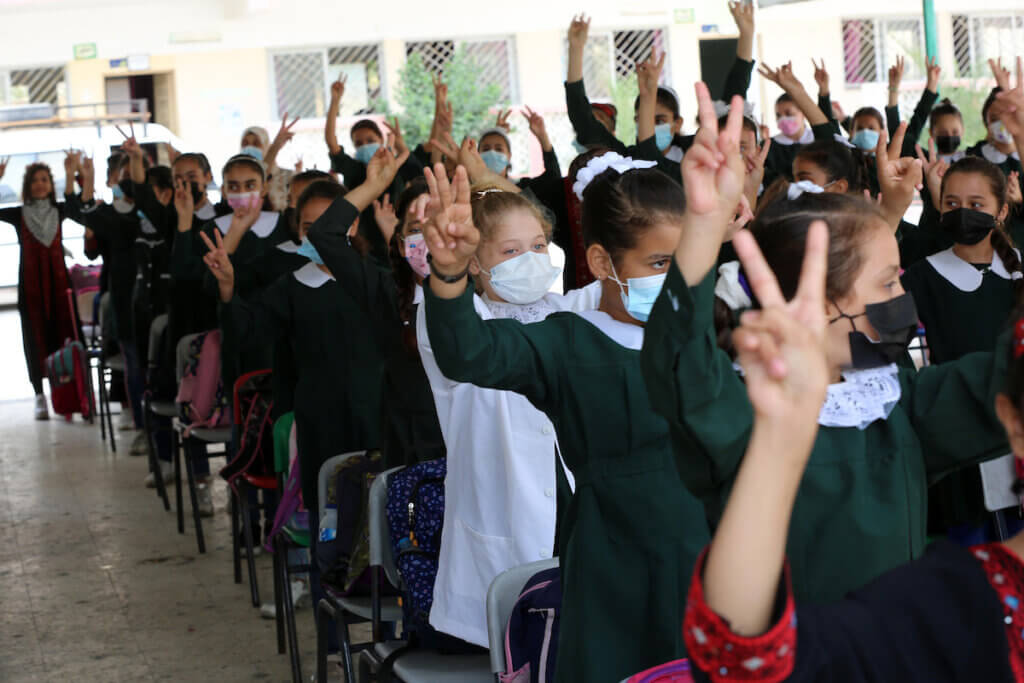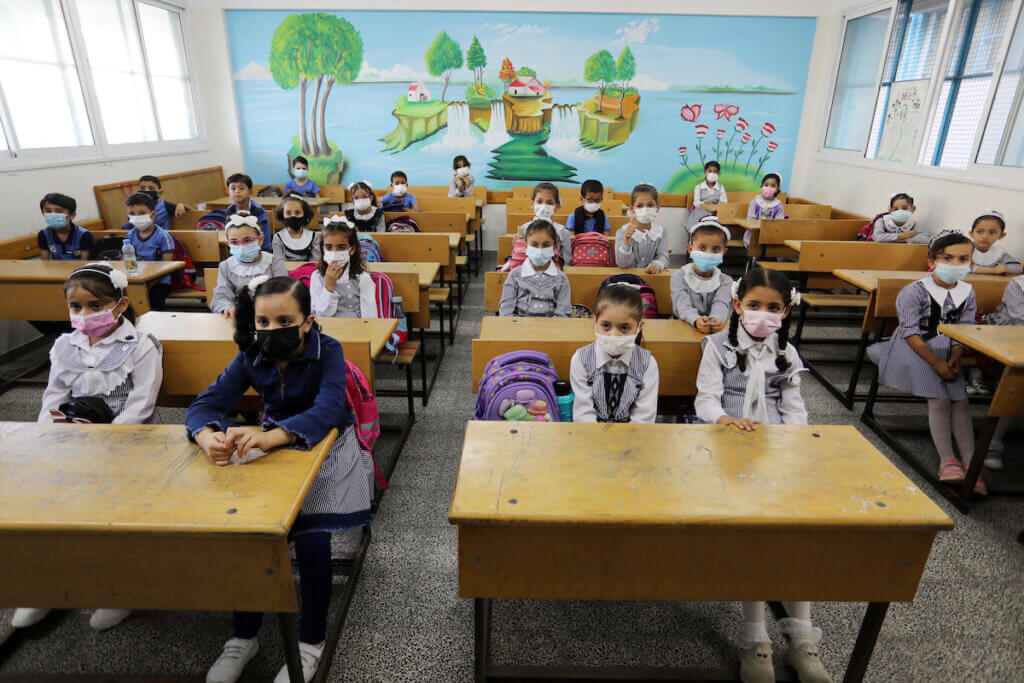In late August students in Gaza headed back to schools where many are learning in overcapacity classrooms with up to three sharing a desk, as educators grapple to find places for pupils whose schools were bombed during a recent escalation with Israel.
According to the Ministry of Education in Gaza, between May 10 and May 21, Israeli forces severely damaged 65 schools and moderately damaged 39. Palestinian rocket fire damaged three schools in Israel. Initially, this left 41,897 without any school to go to. Buildings with minor damages—broken windows, doors, and fences—were repaired in the four months since a ceasefire was declared, but a remaining 800 children are being sent to nearby schools for split sessions.
“I know I’m going to move to another school,” said Nassem Abu Jabal, 14, who was supposed to start his eighth-grade year at Sabha al-Harazin in the Shuja’iyya neighborhood in eastern Gaza. “This would have been my last year at my school and I wish I could have spent it there to say goodbye to everything we made. But this is what war does, you can’t say goodbye to anything,” he lamented.
Abu Jabal lives close to the border with Israel. This area sustained heavy airstrikes and every classroom in his school was damaged. The building’s roof was destroyed. He is now enrolled in the evening hours at the nearby Tunis school.
Due to the pandemic, spring education officials capped the number of students per class at “40 to, 42 at maximum,” said Ahmed Najar, head of public relations at the Ministry of Education. Yet a number of schools were granted an exception to raise the density to 50 students to a room.
“We do not want our students to suffer and lose the opportunity to start a new year of the school, but we have to work within our possibilities,” Najar said.
“In the cases that a school sustained partial damage, such as a few classrooms destroyed, we will send students to other room in the same school,” Najar added.

Children will be required to wear masks, but rooms do not have enough space to practice social distancing. Aside from sharing desks, many will share books, writing utensils, and stationery.
A school psychologist at Tunis school, Diaa al-Sous, said that the new circumstances change the students’ behavior. The crowded classes and the psychological trauma they experienced in the last war have made children quick to anger and highly anxious.
Just in the first week of school alone, al-Sous said at least six fights broke out among pupils. “Students have become very scared of their future, and they keep losing their most precious places like homes and schools,” he said.

Some parents were awaiting the return to in-person learning after months of distance education left their kids falling behind. Mirvat Abdelsalam has five children in elementary and middle school and became instructor to all five when the pandemic caused closures.
“It was really hard to provide five electronic devices for them to keep up with their online lessons, our financial situation did not allow it,” she said. “We only have one for all five, they shared it but sometimes two of them had online lessons at the same time,” she explained.
Abdelsalam makes a habit of celebrating the start of the school year. “We brought them new uniforms, stationery and bags, we were waiting for this moment,” she said. Yet when her brood came home after the first day of class, they were frustrated to find their school still had damage from the May escalation, and their classrooms were filled beyond the number of available chairs.
“The moment I entered the school and saw the damages on the walls, I remembered the sound of bombs.”
Moaaz Abdelsalam
Her son Moaaz, who is in the seventh grade, chimed in, “The moment I entered the school and saw the damages on the walls, I remembered the sound of bombs.”
Other students are returning to school for the first time after sustaining injuries last May. Saleh Hamed, a third-grader from the Shuja’iyya neighborhood in eastern Gaza, insisted on using crutches instead of his wheelchair, which he uses after his foot was amputated following a shrapnel injury. During the fighting with Israel, he was walking by a cemetery that was hit in an airstrike, along with his father and brother. In the blast, his hand was also damaged and he now has a metal implant.
When neighborhood children began talking about returning to the classroom in August, especially Hamed’s brothers, he started walking again for the first since the bombing, with the support of his crutches. Once in school, he was happy to see all of his classmates and regale them with stories about his wound, and how he evaded death.
“I know that I’m not like others now, but in school, I feel that I’m special,” Hamed said.
Yet two days later administrators sent him home with a letter that said he could no longer be enrolled due to their inability to provide accommodations. He was told he could appeal through the Ministry of Education. The family did just that and he was reinstated days later.
“The ministry said that the boy should be in an appropriate environment for his sake,” Hamed’s father said. “They do not want the boy to feel any psychological harm due to his disability.”
Tareq S. Hajjaj
Tareq S. Hajjaj is a freelance journalist and a member of Palestinian Writers Union. He studied English Literature at Al-Azhar university in Gaza. He started his career in journalism in 2015 working as news writer/translator at the local newspaper Donia al-Watan. He has reported for Elbadi, the Middle East Eye, and Al Monitor.
So where are the Palestinian voices in mainstream media?
Mondoweiss covers the full picture of the struggle for justice in Palestine. Read by tens of thousands of people each month, our truth-telling journalism is an essential counterweight to the propaganda that passes for news in mainstream and legacy media.
Our news and analysis is available to everyone – which is why we need your support. Please contribute so that we can continue to raise the voices of those who advocate for the rights of Palestinians to live in dignity and peace.
Palestinians today are struggling for their lives as mainstream media turns away. Please support journalism that amplifies the urgent voices calling for freedom and justice in Palestine.
Related posts:
Views: 0
 RSS Feed
RSS Feed

















 September 27th, 2021
September 27th, 2021  Awake Goy
Awake Goy 
 Posted in
Posted in  Tags:
Tags: 
















